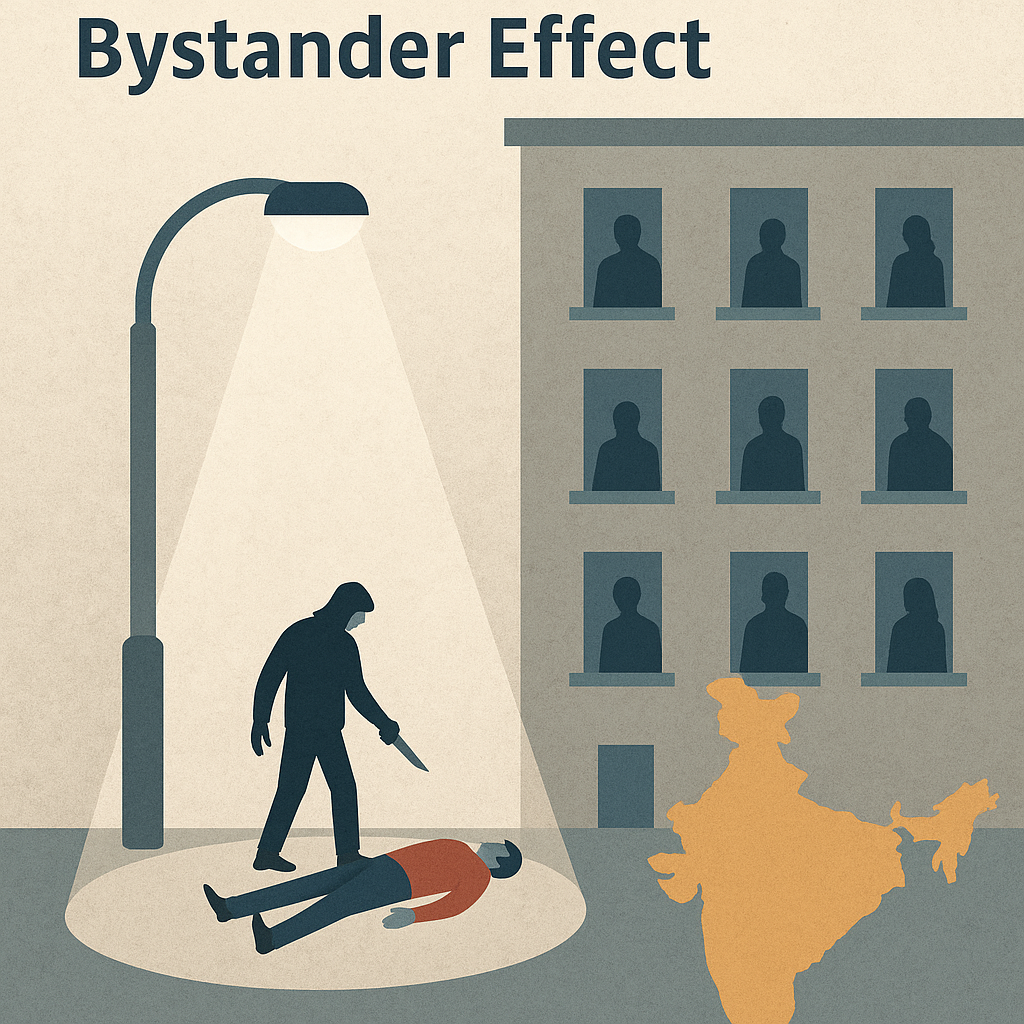
The famous bystander effect was first noticed by two psychologists, Latane and Darley, after a murder occurred in New York’s Kew Gardens at 3:00 a.m. There was nothing extraordinary about the victim, the murderer, or even the method. What made headlines in the New York Times was the manner in which the murder took place – slowly, over half an hour, with the killer returning multiple times to finish the job, while 38 people watched from their apartments.
No one intervened. No one even shouted.
So, Latane came with this hypothesis which was validated several times that people did not act not because they were apathetic or morally apathetic, but they did not act because they felt that others might know better and may have some reason of not intervening. That is why they also did not intervene. More importantly, there was a diffusion of responsibility. As so many people were witnessing the obligation to act on you got diluted. They called this the bystander effect that if a few people will be targeted or one or two people will be targeted and many are watching the chances of their taking an action are not as high as you would ordinarily believe.
Now, consider how global affairs function today. The dynamics of that tragic New York street corner echo through the corridors of international diplomacy. When a stronger nation targets a weaker one, we often hear words of sympathy. But action to counter injustice is rare. Diplomatic condemnation is easy. Collective action is hard.
When Nations Watch from Their Balconies
Take a recent example. In April, the diplomatic compound of Iran in Syria was bombed – an unambiguous violation of sovereignty. Many nations issued statements condemning the act. But no material support was extended. Not one nation intervened. And as expected, when Iran was attacked and bombed, it stood alone too.
This scenario closely mirrors the psychological pattern Latane and Darley identified. Everyone watches. No one moves. Responsibility diffuses. Silence prevails.
This is the risk facing BRICS today.
If a 10% tariff is suddenly slapped on all BRICS nations, there is a possibility of a collective reaction- but only if the measure affects all equally. If such a move targets only those advocating for de-dollarization, and India is not one of them, then India is spared. It becomes easier, and more strategic, to step aside. India is doing that. Because unfortunately the world is becoming more and more like that.
India’s Middle-Power Moment: Pragmatic, Not Passive
India has rightly clarified that it does not support de-dollarization, and hence does not expect to be impacted by the proposed tariff. This position is sound from a realist economic perspective. But it also highlights a deeper truth: India must be prepared to stand alone -strategically, economically, and politically. If others support us, that’s a bonus. But we cannot count on it.
This is where India’s identity as a middle power comes into play. Middle powers do not aim to dominate the global order, but neither can they afford to be reactive. India must retain the delicate balance between strategic autonomy and economic pragmatism.
The BRICS Dilemma: Structure Without Spine
BRICS, in its current form, has limitations. It has no permanent secretariat, no structured mechanism for coordinated response – either in security or trade. And yet, BRICS remains a powerful platform.
India, with its bureaucratic depth and diplomatic credibility, has provided effective leadership in the bloc. Prime Minister Narendra Modi’s foreign policy team has brought seriousness and agency to BRICS proceedings. India has taken firm, reasoned positions – like distancing itself from hardline anti-dollar narratives – while continuing to support multilateral reform and South-South cooperation.
Even under pressure, India must not exit BRICS. It should remain at the table no matter what the cost, as BRICS can serve three critical functions.
Three Ways India Can Lead BRICS
- Reform Global Institutions BRICS must be a platform to voice the growing dissatisfaction with outdated global governance. The UN, World Bank, and IMF no longer reflect today’s multipolar realities. Reform is a long road, but platforms like BRICS help keep the spotlight where it belongs.
- Build South-South Trade and Resilience BRICS nations can deepen intra-group trade in areas like pharmaceuticals, digital payments, renewable energy, and AI. These are sectors where India has credibility and can lead by example.
- Preserve the Egalitarian Ethic The post-WWII global order, shaped by Bretton Woods and the UN Charter, was based – at least nominally – on equality among nations. That ethic is now under threat. Countries like Congo are mocked. Embassies are being withdrawn from poor, undeveloped nations. A new, hierarchical global ethic is emerging.
But the egalitarian ideal hasn’t vanished. It is still rooted in international law, multilateral institutions, and democratic norms. And India, through forums like BRICS, can keep that ethic alive – if not in power, at least in principle.
This article’s video form can be watched here: https://youtu.be/sUqLaJgdd3s